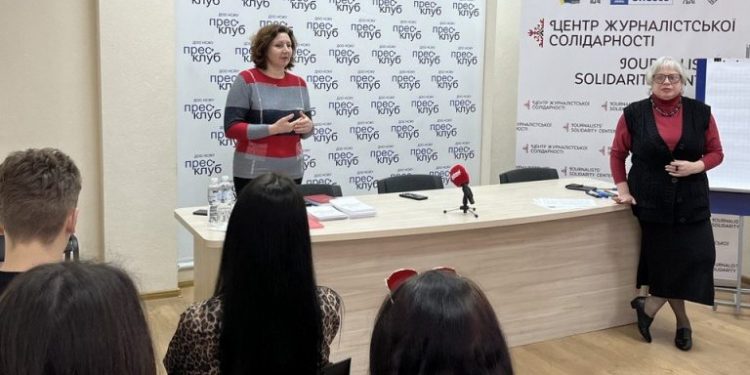Student journalists from the University of Customs and Finance were taught the basics of time management at the Dnipro Journalists’ Solidarity Center of the National Union of Journalists of Ukraine (NUJU).
Training speaker was Nataliya Russu, a member of the NUJU / a deputy head of the communications department of the regional center for free secondary legal assistance provision. The coach, with over 40 years of experience in journalism, says that she would not have time to complete many tasks if it were not for intelligent planning.
Nataliya Russu told future journalists how to distinguish cases according to the principle of urgent/important, how to motivate yourself to live according to the plan, and why to do it. The trainer also presented the audience with the effective technique of the Eisenhower Matrix, also known as the Eisenhower Square, and gave some practical tips on time management:
– first of all, realize that you do not know how to use your time wisely;
– make up a to-do list for the week on a piece of paper and rate each of the tasks on the important-urgent scale;
– sort things by day of the week and note the time intervals;
– do not plan several things for one period of time;
– do not put off small things for later;
– alternate types of activities;
– learn to say “no” to tasks (and people) that have not been identified as a priority;
– follow the routine of the day: a tired, exhausted person will not work efficiently;
– plan not only work but also rest;
– praise yourself if you manage to follow the “prescribed” rules.
According to Natalia Kodatska, a university teacher and head of the journalism department, the training helped students develop essential skills: the ability to organize themselves, discipline, and take responsibility for tasks, which is vital in journalism, advertising, and public relations.
“I came to this training to figure out how to plan my schedule. Earlier, there were attempts, but they were unsuccessful. There was a lack of information and knowledge. Now, it seems that everything is explained pretty clearly. Now, I have an understanding of priorities. These skills will let me not be torn between studies, hobbies, and personal life,” student Kateryna Rubanova said.
“I was immediately interested in the topic of the training. I confess that I do not know how to plan time. Most of us write a plan but can’t determine what is urgent or important on the list. I received a lot of new information, and I hope that I will be able to put it into practice. I will work on it,” added student Danylo Prykhodko.
We would like to remind you that the Dnipro Journalists’ Solidarity Center of the NUJU provides journalists with organizational, technical, and consulting assistance and conducts various events, trainings, and professional meetings. You can come here to work and take advantage of the free rental of high-quality protective equipment for working in hot spots.
To address the Journalists’ Solidarity Center, please call 050 919 8479 (Nataliya Nazarova, the coordinator of the Dnipro Center). Address: 8, Starokozatska Street.
Journalists’ Solidarity Centers is an initiative of the NUJU implemented with the support of the International and European Federations of Journalists, as well as UNESCO. The initiative is designed to help media representatives working in Ukraine during the war. The JSCs operate in Kyiv, Lviv, Ivano-Frankivsk, Chernivtsi, Zaporizhzhia, and Dnipro and provide journalists with organizational, technical, legal, psychological, and other types of assistance.
About UNESCO. UNESCO is the United Nations Educational, Scientific, and Cultural Organization. It contributes to peace and security by promoting international cooperation in education, sciences, culture, communication, and information. UNESCO promotes knowledge sharing and the free flow of ideas to accelerate mutual understanding. It is the coordinator of the UN Action Plan on the Safety of Journalists and the Issue of Impunity, which aims to create a free and safe environment for journalists and media workers, thus strengthening peace, democracy, and sustainable development worldwide. UNESCO is working closely with its partner organizations in Ukraine to provide support to journalists on the ground.
The designations employed and the presentation of material throughout this digest do not imply the expression of any opinion whatsoever on the part of UNESCO concerning the legal status of any country, territory, city or area or its authorities, or concerning the delimitation of its frontiers or boundaries.
The authors are responsible for the choice and the presentation of the facts contained in this digest and for the opinions expressed therein, which are not necessarily those of UNESCO and do not commit the Organization.
Dnipro Journalists’ Solidarity Center

 THE NATIONAL UNION OF
JOURNALISTS OF UKRAINE
THE NATIONAL UNION OF
JOURNALISTS OF UKRAINE
















Discussion about this post